The automotive industry is undergoing a monumental transformation driven by the relentless march of technology. Gone are the days when vehicles were purely mechanical machines. Today, they are increasingly sophisticated computers on wheels, brimming with software, sensors, and connectivity features. This evolution has created an urgent need for car manufacturers to adopt modern software development and deployment practices. DevOps for car manufacturers has emerged as a critical enabler in this journey.
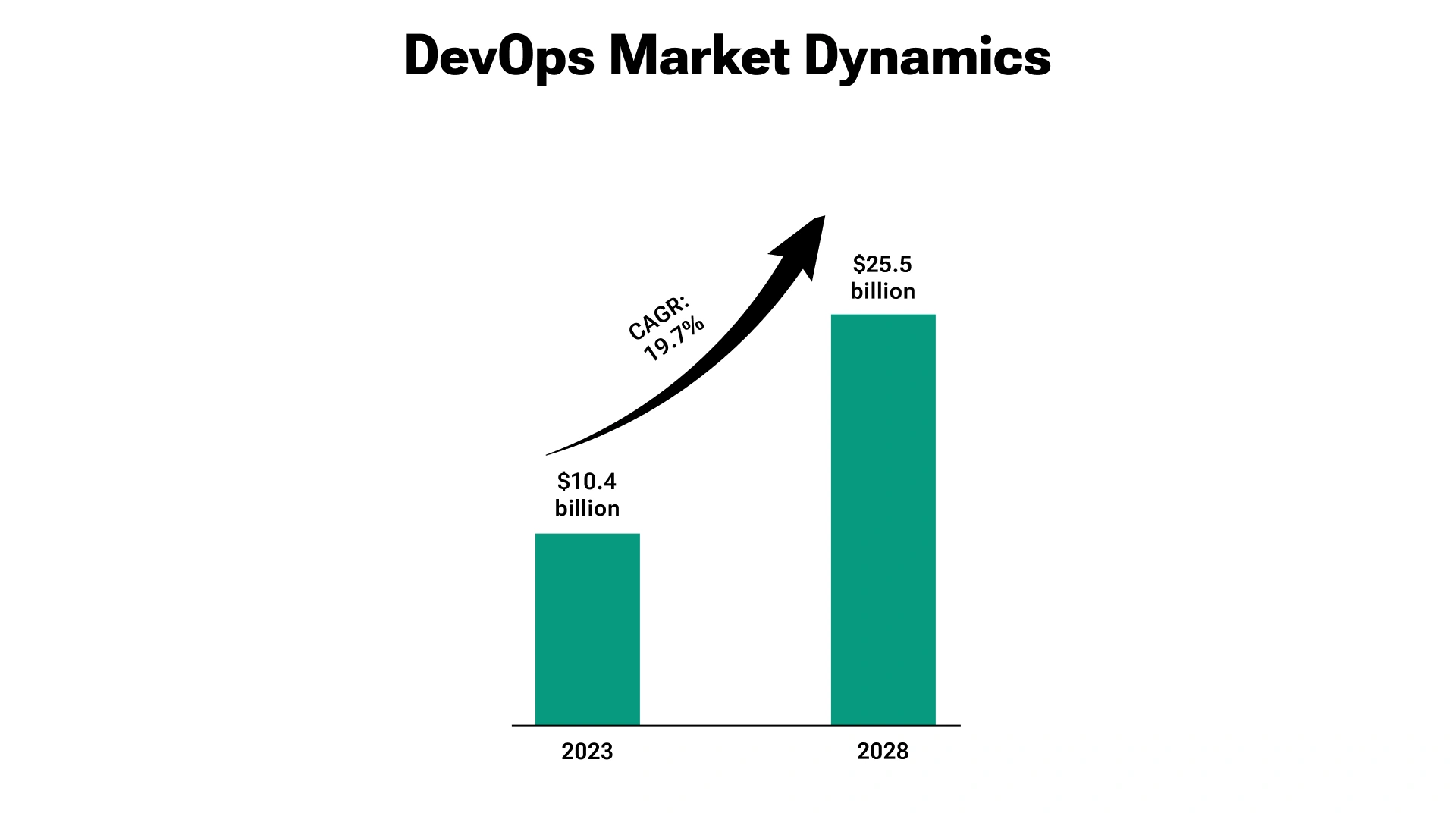
This data indicates the increasing recognition of DevOps methodologies as essential for businesses to thrive in the digital age, and the automotive sector is no exception.
For DevOps in automotive to truly take hold, car manufacturers must understand the nuances of this approach and tailor it to their unique challenges and opportunities. The application of devops in car manufacturing is no longer a futuristic concept but a present-day necessity for staying competitive and delivering cutting-edge vehicles.
What Are Smart & Connected Vehicles?
Smart and connected vehicles represent a paradigm shift in automotive engineering. They go beyond basic functionalities, integrating advanced software, sensors, and network connectivity to enhance the driving experience, safety, and overall vehicle lifecycle.
Smart Vehicles:
These vehicles have sophisticated onboard systems that enhance functionality and intelligence. These include advanced driver-assistance systems (ADAS) such as adaptive cruise control, lane departure warning, and automatic emergency braking. Smart vehicles also feature sophisticated infotainment systems, advanced diagnostic capabilities, and personalized user experiences.
The core of their intelligence lies in the embedded software and electronic control units (ECUs) that manage various vehicle functions. Integrating DevOps with embedded systems is crucial for ensuring smooth and efficient operation of these complex software-driven features.
Connected Vehicles:
These vehicles can communicate with their surroundings, including other vehicles (V2V), infrastructure (V2I), pedestrians (V2P), and the cloud (V2C). This connectivity enables a wide range of services, such as real-time traffic updates, over-the-air (OTA) software updates, remote diagnostics, and access to cloud-based applications.
A defining characteristic of connected vehicles is the seamless data flow between the vehicle and the external world. Integrating IoT with embedded systems forms the backbone of this connectivity, allowing for the collection, transmission, and analysis of vast amounts of vehicle data.
The convergence of "smart" and "connected" features defines the modern automotive landscape. These vehicles are not just modes of transportation; they are increasingly integrated into the digital ecosystem, offering a wealth of data and opportunities for innovation.
Key Features and Systems of Smart & Connected Vehicles
Smart and connected vehicles encompass complex features and systems, all heavily reliant on software and seamless connectivity. Understanding these components is crucial for appreciating the role of DevOps in automotive.
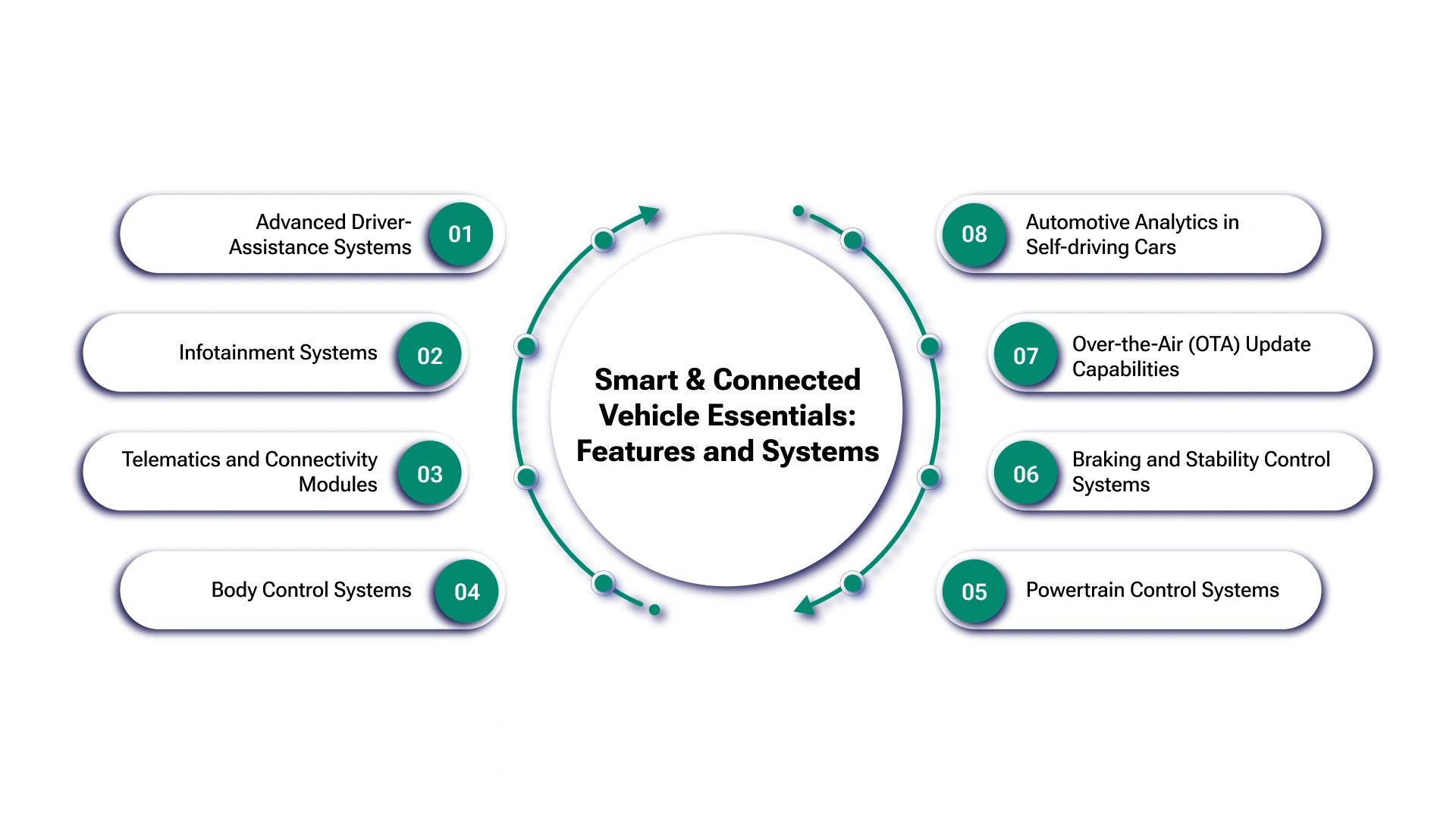
Advanced Driver-Assistance Systems (ADAS):
These systems utilize sensors (cameras, radar, lidar) and sophisticated algorithms to assist drivers with parking, lane keeping, collision avoidance, and adaptive cruise control tasks. The software controlling these systems requires frequent updates and rigorous testing.
Infotainment Systems:
Modern infotainment systems offer various features, including navigation, multimedia playback, smartphone integration, and access to different online services. These systems are complex software applications that need continuous improvement and updates.
Telematics and Connectivity Modules:
These components enable communication between the vehicle and the external world. They facilitate features like OTA updates, remote diagnostics, emergency services, and vehicle tracking. Robust and secure connectivity is paramount.
Body Control Systems:
These systems manage various electrical functions within the vehicle, such as lighting, power windows, and door locks. While seemingly basic, their software is integral to the overall vehicle operation.
Powertrain Control Systems:
In both traditional and electric vehicle software development, sophisticated software manages the engine or electric motor, transmission, and battery systems to optimize performance, efficiency, and emissions.
Braking and Stability Control Systems:
These safety-critical systems rely heavily on real-time data processing and complex algorithms to ensure vehicle stability and prevent accidents. Their software demands the highest levels of reliability and safety.
Over-the-Air (OTA) Update Capabilities:
This is a defining feature of connected vehicles, allowing manufacturers to update vehicle software remotely, fix bugs, add new features, and improve performance without requiring physical visits to a service center. Efficient OTA update management is crucial for maintaining and enhancing the value of these vehicles.
Automotive Analytics in Self-driving Cars:
As vehicles move towards higher levels of autonomy, data analytics becomes even more critical. Self-driving cars rely on vast amounts of sensor data and complex algorithms for perception, decision-making, and control. Automotive Analytics in Self-driving cars necessitates robust data pipelines and analytical tools.
The intricate interplay of these software-intensive systems highlights the need for efficient and agile development and deployment processes, making DevOps an indispensable approach for car manufacturers.
Why DevOps In the Automotive Industry?
The traditional waterfall software development model, often employed in the automotive industry, struggles to keep pace with modern vehicles' rapid advancements and increasing complexity. DevOps in automotive offers a solution by fostering collaboration, automation, and continuous improvement throughout the software lifecycle.
- Increased Software Complexity: Modern vehicles contain millions of lines of code, managing everything from engine control to infotainment systems. DevOps provides the methodologies and tools to manage this complexity effectively.
- Faster Time-to-Market: The automotive industry faces increasing pressure to quickly deliver new features and models. DevOps accelerates the development and deployment process, enabling more rapid innovation cycles.
- Enhanced Software Quality and Reliability: Safety-critical systems rely on software, so quality and reliability are paramount. DevOps practices like continuous testing and integration help identify and resolve issues early in the development cycle.
- Seamless Over-the-Air (OTA) Updates: DevOps principles and practices are fundamental to enabling efficient and reliable OTA updates, which are crucial for delivering new features, bug fixes, and security patches to connected vehicles.
- Improved Collaboration: DevOps promotes collaboration and communication between development, operations, and testing teams, breaking down silos and fostering a more efficient workflow.
- Faster Feedback Loops: Central to DevOps, continuous integration and continuous delivery (CI/CD) pipelines enable more rapid feedback loops, allowing development teams to quickly identify and address issues based on testing and real-world data.
- Enhanced Cybersecurity: With increasing connectivity, cybersecurity is a significant concern. DevSecOps for cybersecurity on vehicle networks integrates security practices throughout the development lifecycle, ensuring the resilience of vehicle systems against cyber threats.
- Efficient Management of Embedded Systems: Integrating DevOps with embedded systems allows for better software development lifecycle management for the numerous ECUs within a vehicle.
- Streamlined Compliance: Industries like automotive have stringent regulatory requirements (e.g., ISO 26262). ISO 26262-compliant DevOps practices help ensure software development processes adhere to these safety standards.
DevOps Tools for Smart & Connected Vehicles
Implementing DevOps for car manufacturers requires robust tools that cater to the industry's specific needs, including managing embedded systems and ensuring safety and security. Automotive-grade DevOps tools are evolving to meet these demands.
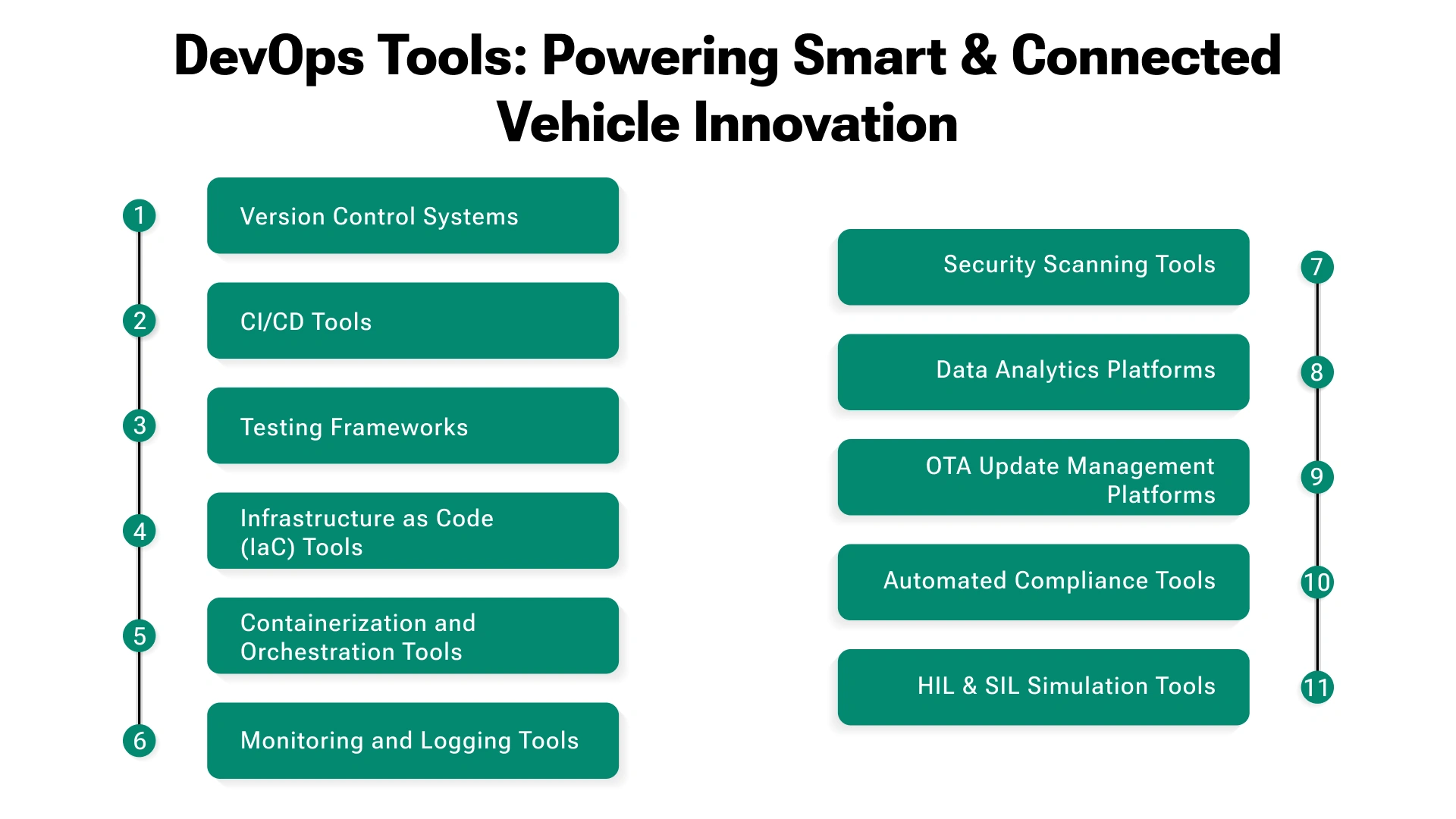
- Version Control Systems (e.g., Git): Essential for managing code changes and collaboration among skilled DevOps engineers working on various vehicle software components.
- Continuous Integration/Continuous Delivery (CI/CD) Tools (e.g., Jenkins, GitLab CI, Azure DevOps): Automate the build, test, and deployment processes, which are crucial for frequent and reliable software updates. This section covers how to implement CI/CD for automotive software.
- Testing Frameworks: To ensure the quality and reliability of automotive software, various testing tools are needed, including unit testing, integration testing, system testing, and hardware-in-the-loop (HIL) testing for realistic simulation of vehicle systems. Rigorous vehicle testing before deployment is non-negotiable.
- Infrastructure as Code (IaC) Tools (e.g., Terraform, Ansible): Automate the provisioning and management of the underlying infrastructure needed for development, testing, and deployment environments, including Automotive IaC best practices.
- Containerization and Orchestration Tools (e.g., Docker, Kubernetes): Facilitate the packaging and deployment of software components, improving consistency and scalability, particularly for cloud-based services interacting with vehicles.
- Monitoring and Logging Tools (e.g., Prometheus, Grafana, ELK stack): Provide real-time insights into the performance and health of vehicle software and connected services, which are crucial for identifying and resolving issues quickly.
- Security Scanning Tools: Integrate security checks into the CI/CD pipeline to identify vulnerabilities early in the development process, a key aspect of DevSecOps for cybersecurity on vehicle networks.
- Data Analytics Platforms: Tools for collecting, processing, and analyzing the vast amounts of data generated by connected vehicles, enabling Automotive Analytics in Self-driving Cars and other data-driven services.
- OTA Update Management Platforms: Specialized tools for managing the process of delivering and installing software updates to vehicles remotely, ensuring security and reliability in OTA update management.
- Automated Compliance Tools: Tools that help automate checks for adherence to industry standards like MISRA C, ensuring Automating MISRA C compliance in DevOps.
- Hardware-in-the-Loop (HIL) and Software-in-the-Loop (SIL) Simulation Tools: These tools allow for rigorous testing of embedded software in simulated environments, reducing the need for extensive physical testing and improving the efficiency of vehicle testing before deployment.
The selection and integration of these Automotive-grade DevOps tools are critical for successful DevOps in automotive adoption.
The Imperative of DevOps for Smart & Connected Vehicle Development
The automotive industry is undergoing a profound transformation, driven by the relentless integration of software into every aspect of the vehicle. Smart and connected vehicles, with their complex interplay of embedded systems, cloud services, and constant connectivity, represent a paradigm shift that demands a corresponding evolution in development methodologies.
The traditional, siloed approaches that once governed automotive engineering are proving increasingly inadequate to handle modern vehicles' speed, complexity, and interconnectedness. This necessitates a fundamental change, making the adoption of DevOps for car manufacturers not just a beneficial strategy but a critical imperative for navigating the future of mobility.
Here's why DevOps is no longer optional but essential for the development of smart and connected vehicles:
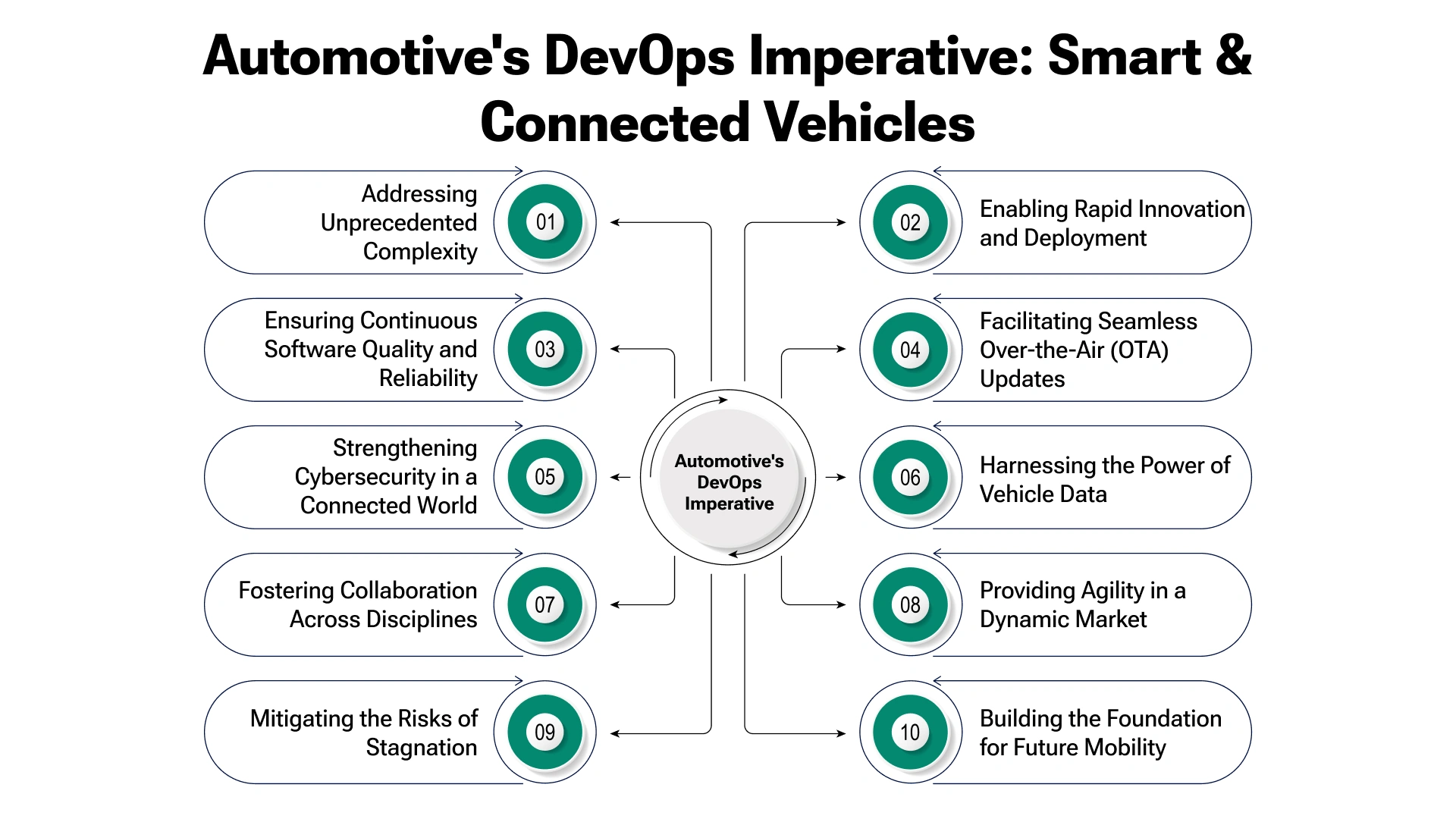
- Addressing Unprecedented Complexity: Modern vehicles are intricate systems with millions of lines of code managing everything from safety-critical functions to infotainment. DevOps provides the frameworks and tools to manage this escalating software complexity effectively.
- Enabling Rapid Innovation and Deployment: The demand for new features, enhanced performance, and seamless digital experiences requires faster development and deployment cycles than traditional automotive processes can support. DevOps accelerates this through automation and collaboration.
- Ensuring Continuous Software Quality and Reliability: Software controls critical vehicle functions, so quality and reliability are paramount. DevOps practices like continuous testing and integration are crucial for identifying and mitigating issues early and often.
- Facilitating Seamless Over-the-Air (OTA) Updates: OTA updates are a cornerstone of modern vehicle ownership, enabling continuous improvement and new feature delivery. DevOps provides the essential infrastructure and processes for secure and efficient OTA update management.
- Strengthening Cybersecurity in a Connected World: Vehicles' increasing connectivity exposes them to cyber threats. DevSecOps for cybersecurity on vehicle networks, an integral part of DevOps, ensure security is baked into the development lifecycle from the outset.
- Harnessing the Power of Vehicle Data: Smart and connected vehicles generate vast data. DevOps facilitates the creation of robust data pipelines and analytical platforms necessary to leverage this data for vehicle improvement and new services like Automotive Analytics in Self-driving Cars.
- Fostering Collaboration Across Disciplines: Developing smart and connected vehicles requires close collaboration between software, hardware, and operations teams. DevOps breaks down traditional silos, promoting communication and shared responsibility.
- Providing Agility in a Dynamic Market: The automotive landscape is rapidly evolving. DevOps provides the agility to adapt to changing consumer demands, technological advancements, and regulatory requirements.
- Mitigating the Risks of Stagnation: Manufacturers who fail to embrace modern software development practices like DevOps risk falling behind competitors who can deliver innovation and updates faster.
- Building the Foundation for Future Mobility: DevOps is not just about improving current processes; it's about establishing the agile and collaborative foundation necessary for developing and managing the increasingly software-centric vehicles of tomorrow, including autonomous and electric vehicles.
Role of DevOps in Accelerating Vehicle Software Updates
One of the most significant benefits of DevOps for car manufacturers is its ability to accelerate the delivery of vehicle software updates dramatically. Traditional methods often involve lengthy development cycles and manual deployment processes, leading to delays in releasing new features, bug fixes, and security patches. DevOps for synchronizing software updates provides a streamlined and automated approach.
- Continuous Integration (CI): Developers frequently merge code changes into a central repository. Automated build and testing processes ensure these changes are integrated smoothly, and any conflicts or issues are identified early. This frequent integration reduces the complexity and risk of large, infrequent code merges.
- Continuous Delivery (CD): Once code changes pass automated tests, they are automatically prepared for release to production-like environments. This ensures that the software is always in a deployable state, significantly reducing the time required to release new updates.
- CI/CD Pipelines for OTA Updates: How do CI/CD pipelines help in OTA (Over-the-Air) updates through automation? CI/CD pipelines can be specifically designed to build, test, and package software updates for over-the-air deployment. These pipelines can also automate the staging and rollout of vehicle updates, ensuring a controlled and efficient process. This automation minimizes manual intervention, reduces the risk of errors, and accelerates the delivery of updates to the vehicle fleet.
- Faster Feedback and Iteration: DevOps practices enable speedier feedback loops from testing and even from vehicles in the field (through telemetry). This allows development teams to identify and address issues quickly, leading to more frequent and higher-quality updates.
- Improved Agility: DevOps's iterative nature allows automotive manufacturers to respond more quickly to changing market demands and customer feedback by delivering new features and improvements through frequent software updates.
By leveraging DevOps, car manufacturers can move away from infrequent, significant software releases to a continuous improvement and delivery model, keeping their vehicles up-to-date with the latest features and security enhancements.
How to Implement DevOps for Smart & Connected Vehicles
Implementing DevOps for car manufacturers is a complex undertaking that requires careful planning, cultural shifts, and adopting new tools and processes. Here are key steps involved in how to implement DevOps for Smart & Connected Vehicles:
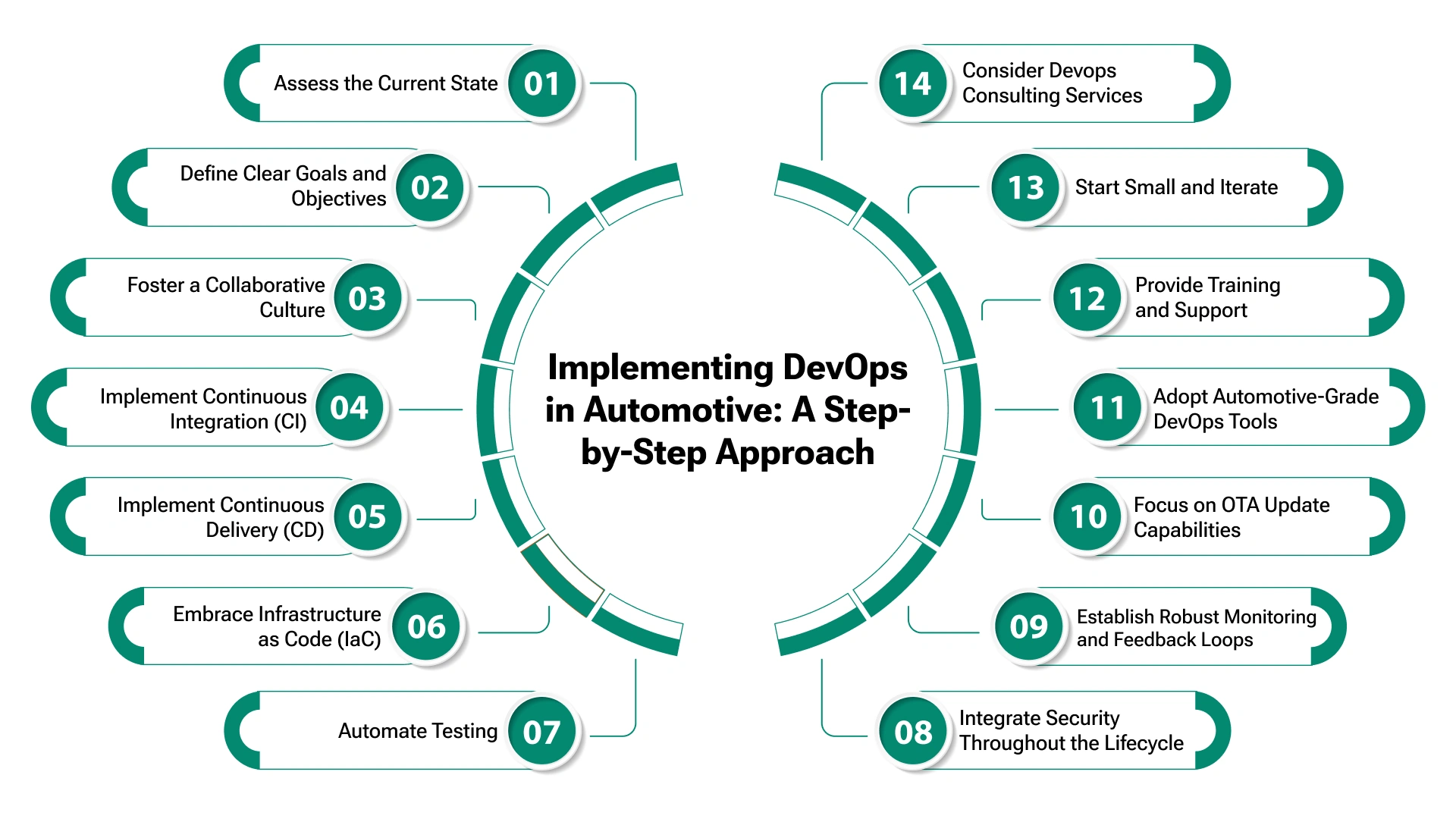
1. Assess the Current State:
Understand the existing software development and deployment processes, identify bottlenecks, and evaluate the organizational culture and readiness for change. This assessment should include both embedded systems development and cloud-based service development.
2. Define Clear Goals and Objectives:
Determine the specific outcomes you want with DevOps, such as faster release cycles, improved software quality, or more efficient OTA updates. These goals should be measurable and aligned with business objectives.
3. Foster a Collaborative Culture:
Break down silos between development, operations, testing, and security teams. Promote communication, transparency, and shared responsibility. This cultural shift is fundamental to successful DevOps in automotive.
4. Implement Continuous Integration (CI):
Establish automated processes for building, testing, and integrating code changes frequently. This requires setting up version control systems, building servers, and automated testing frameworks suitable for automotive software.
5. Implement Continuous Delivery (CD):
Automate preparing and deploying software to various environments, including testing, staging, and production (for cloud services and OTA updates). This involves setting up deployment pipelines and infrastructure automation tools.
6. Embrace Infrastructure as Code (IaC):
Utilize Infrastructure as Code (IaC) for vehicle testing and production environments. Automate the provisioning and management of infrastructure using tools like Terraform or Ansible. This ensures consistency and repeatability.
7. Automate Testing:
Implement comprehensive automated testing at all development lifecycle stages, including unit, integration, system, and performance tests. This may involve vehicle testing before deployment using HIL and SIL simulation for embedded systems.
8. Integrate Security Throughout the Lifecycle (DevSecOps):
Incorporate security practices and tools into every stage of the development process, from code design to deployment and monitoring. This is crucial for DevSecOps, which is used for cybersecurity on vehicle networks.
9. Establish Robust Monitoring and Feedback Loops:
Implement real-time tools and processes for monitoring vehicle software performance, health, and connected services. Establish feedback mechanisms to identify and address issues quickly.
10. Focus on OTA Update Capabilities:
Design and implement CI/CD pipelines specifically for delivering software updates to vehicles over the air. Ensure the OTA updates the management process's security, reliability, and efficiency.
11. Adopt Automotive-Grade DevOps Tools:
Select and integrate tools suitable for the automotive industry's requirements, including support for embedded systems, safety standards (like ISO 26262 compliant DevOps practices), and real-time operating systems.
12. Provide Training and Support:
Invest in training and upskilling your teams on DevOps principles, practices, and tools. Provide ongoing support and guidance to facilitate the adoption process.
13. Start Small and Iterate:
Begin with pilot projects and gradually expand DevOps adoption across different vehicle systems and teams. Based on feedback and results, continuously evaluate and refine your processes.
14. Consider Devops Consulting Services:
Engaging with experienced devops consulting services can provide valuable guidance and expertise in navigating the complexities of DevOps implementation in the automotive domain.
Notes:- Implementing CI/CD in automotive software and establishing effective implementation methods are crucial for realizing the benefits of DevOps in this industry.
Benefits of DevOps in Car Manufacturing
The adoption of DevOps in car manufacturing offers many benefits that can significantly impact a manufacturer's competitiveness, efficiency, and ability to innovate. These Benefits are increasingly being recognized across the industry.
- Faster Development and Release Cycles: DevOps accelerates the software development lifecycle, enabling manufacturers to bring new features and vehicle models to market faster.
- Improved Software Quality and Stability: Continuous testing and integration practices lead to higher-quality software with fewer bugs and improved reliability, which is crucial for safety-critical automotive systems.
- Seamless and Efficient OTA Updates: DevOps enables the efficient and reliable delivery of over-the-air software updates, enhancing vehicle functionality, security, and the overall user experience.
- Enhanced Collaboration and Communication: DevOps fosters a culture of collaboration and communication across different teams, leading to more efficient workflows and better problem-solving.
- Increased Automation: Automating build, test, and deployment processes reduces manual errors, improves efficiency, and frees development teams to focus on innovation.
- Faster Feedback Loops and Continuous Improvement: DevOps facilitates rapid feedback from testing and real-world usage, enabling teams to identify and address issues and continuously improve their software quickly.
- Enhanced Cybersecurity: Integrating security practices throughout the development lifecycle (DevSecOps) leads to more secure vehicle systems and reduces the risk of cyberattacks.
- Better Management of Complex Systems: DevOps provides the tools and methodologies to effectively manage the increasing complexity of software in modern vehicles, including embedded systems and cloud-based services.
- Reduced Costs: Automation and increased efficiency can lead to lower development and operational costs in the long run.
- Improved Customer Satisfaction: Faster delivery of new features, improved software quality, and seamless OTA updates increase customer satisfaction.
- Facilitates Innovation: By streamlining development and deployment, DevOps allows automotive manufacturers to experiment more efficiently and drive innovation in areas like autonomous driving and connected services.
- Streamlined Compliance with Safety Standards: ISO 26262-compliant DevOps practices help ensure adherence to critical safety regulations, reducing risks and liabilities.
Key Challenges of DevOps for Smart & Connected Vehicles
While DevOps has significant benefits for car manufacturing, implementing it also presents several unique challenges that automotive manufacturers must address.
- Complexity of Embedded Systems: Integrating DevOps with the development of deeply embedded systems with real-time constraints and stringent safety requirements is more complex than traditional software development.
- Stringent Safety and Regulatory Requirements: The automotive industry is subject to strict safety standards (e.g., ISO 26262) and regulations. DevOps processes must be adapted to ensure compliance.
- Long Development Lifecycles for Hardware: The development lifecycle for automotive hardware is typically much longer than for software, creating challenges for aligning hardware and software development within a DevOps framework.
- Real-Time Operating Systems (RTOS): Developing and testing software for RTOS systems requires specialized tools and expertise that may not be common in traditional DevOps teams.
- Hardware-Software Integration: The tight integration between hardware and software in vehicles requires close collaboration and coordination between hardware and software teams within a DevOps framework.
- Over-the-Air (OTA) Update Complexity and Security: Managing and securely delivering OTA updates to a large fleet of vehicles presents significant technical and logistical challenges. Ensuring the integrity and security of these updates is paramount for OTA update management.
- Legacy Systems and Infrastructure: Many established automotive manufacturers have legacy systems and infrastructure that may not be easily integrated with modern DevOps tools and practices.
- Organizational Culture and Resistance to Change: Shifting to a DevOps culture requires significant changes in mindset, processes, and organizational structures. Overcoming resistance to change can be a considerable hurdle.
- Skill Gaps: Finding and retaining talent with the specific skills required for DevOps in automotive, including expertise in embedded systems, cybersecurity, and automotive safety standards, can be challenging.
- Ensuring Vehicle Safety During Continuous Deployment: Implementing continuous deployment for vehicle software requires robust testing and validation processes to ensure that updates do not compromise vehicle safety.
- Managing the Automotive Supply Chain: Integrating DevOps tools for the automotive supply chain requires collaboration and standardization across multiple suppliers and partners, which can be complex.
- Data Security and Privacy: Connected vehicles generate vast amounts of data, raising concerns about data security and privacy. DevSecOps for cybersecurity on vehicle networks must effectively address these concerns.
- Multi-cloud automotive DevOps: Managing software and services across multiple cloud providers (Multi-cloud automotive DevOps) adds complexity to infrastructure management and requires specialized skills.
Addressing these challenges requires a strategic and phased approach to DevOps adoption in the automotive industry. This approach should focus on collaboration, training, and carefully selecting appropriate tools and processes.
Real-world examples of Tesla, BMW, and Ford leveraging DevOps
Several leading automotive manufacturers already leverage DevOps principles and practices to enhance their software development and deployment processes for smart and connected vehicles. These case studies on DevOps in car manufacturing provide valuable insights into real-world applications.
Tesla:
Tesla is widely recognized as a pioneer in utilizing DevOps and over-the-air software updates. They have built a highly integrated software development and deployment pipeline that allows them to rapidly iterate on vehicle features, improve performance, and even introduce entirely new functionalities remotely.
Their ability to deliver frequent and seamless OTA updates is a key differentiator and a testament to their DevOps maturity. Tesla's approach highlights the power of DevOps for synchronizing software updates and its impact on customer experience.
BMW:
BMW has been actively investing in transforming its software development processes with DevOps. They are focusing on building agile teams, implementing CI/CD pipelines, and leveraging cloud technologies to accelerate the development and deployment of software for their connected vehicles and digital services.
BMW's efforts demonstrate the growing recognition of the importance of DevOps in automotive for traditional OEMs to remain competitive in the era of software-defined vehicles. They also explore Automotive ECU integration with DevOps to streamline embedded software development.
Ford:
Ford is also on a journey to adopt DevOps practices across its organization. They focus on improving collaboration between software and hardware teams, implementing CI/CD for their in-car software and cloud-based services, and enhancing their OTA update capabilities.
Ford's strategic shift towards DevOps underscores the understanding that efficient software development and deployment are crucial for delivering innovative, connected vehicles at scale. Their initiatives include exploring automotive analytics in Self-driving cars and leveraging data-driven insights for vehicle improvement.
These examples illustrate how DevOps for car manufacturers is being implemented in practice, driving faster innovation, improving software quality, and enhancing the overall ownership experience for customers.
Future of DevOps for Smart & Connected Vehicles
The role of DevOps for smart and connected vehicles is only set to become more critical in the future as vehicles become even more software-dependent, autonomous, and integrated into the broader digital ecosystem. Several key DevOps trends will shape the future of automotive.
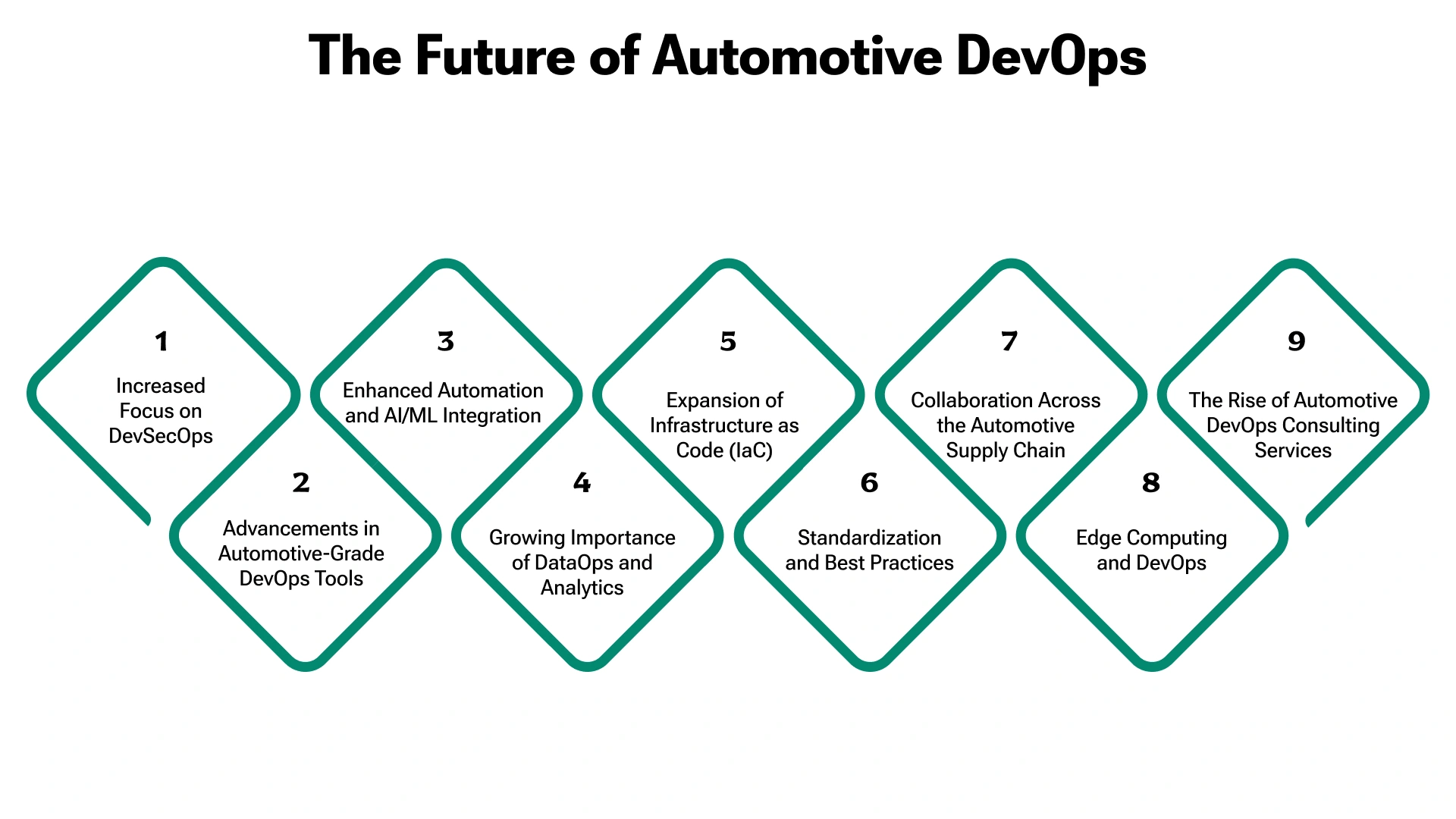
Increased Focus on DevSecOps:
As vehicles become more connected and vulnerable to cyber threats, integrating security into every development lifecycle stage (DevSecOps for cybersecurity on vehicle networks) will become even more paramount.
Advancements in Automotive-Grade DevOps Tools:
We will see the development of more specialized Automotive-grade DevOps tools that cater to the unique challenges of embedded systems, safety-critical software, and real-time operating systems.
Enhanced Automation and AI/ML Integration:
Automation will extend beyond CI/CD pipelines to include more aspects of testing, compliance checks (e.g., Automating MISRA C compliance in DevOps), and even anomaly detection in-vehicle software using AI Development Services and ML development services.
Growing Importance of DataOps and Analytics:
As vehicles generate vast amounts of data, DevOps will increasingly need to integrate with DataOps practices to efficiently manage, process, and analyze this data for vehicle improvement, predictive maintenance, and the development of new services (Automotive Analytics in Self-driving Cars).
Expansion of Infrastructure as Code (IaC):
Infrastructure as Code (IaC) for vehicle testing and deployment will become more widespread, enabling greater consistency, scalability, and efficiency in managing the complex infrastructure supporting connected vehicles.
Standardization and Best Practices:
As DevOps in automotive matures, we will likely see more standardized processes and DevOps best practices emerge, potentially influencing regulatory frameworks.
Collaboration Across the Automotive Supply Chain:
DevOps principles will likely extend to the broader automotive supply chain, fostering better collaboration and integration among OEMs and their suppliers (DevOps tools for automotive supply chain).
Edge Computing and DevOps:
With increasing processing power at the edge (within the vehicle), DevOps practices must evolve to efficiently manage and deploy software and updates to these distributed environments.
The Rise of Automotive DevOps Consulting Services:
As the adoption of DevOps in the automotive industry accelerates, the demand for specialized Automotive DevOps consulting services and devops development services will continue to grow.
The future of DevOps for smart & connected vehicles is dynamic and promises to be a key enabler of innovation, safety, and efficiency in the automotive industry.
Choose VLink DevOps Expertise for the Automotive Industry
Navigate the complexities of DevOps in automotive with VLink. Our specialized devops consulting services provide car manufacturers with the expertise for smart and connected vehicles. We excel in integrating DevOps with embedded systems, establishing robust CI/CD in Automotive pipelines, and ensuring secure OTA update management while adhering to ISO 26262-compliant DevOps practices.
VLink's proficiency includes integrating IoT with embedded systems and leveraging Automotive Analytics in Self-driving Cars. We offer tailored devops development services encompassing Automotive ECU integration with DevOps, Automating MISRA C compliance in DevOps, and robust DevSecOps for cybersecurity on vehicle networks.
Partner with VLink's dedicated team to accelerate innovation and deliver exceptional vehicles. Connect with us today to discover how our Automotive DevOps consulting services can drive your success.

Conclusion
The transition to smart and connected vehicles has fundamentally changed the automotive landscape, placing software at the heart of vehicle functionality and user experience. In this new era, traditional development methodologies are no longer sufficient. DevOps for car manufacturers has emerged as a critical necessity, offering the principles, practices, and tools required to manage the increasing complexity of vehicle software, accelerate innovation, enhance quality and security, and deliver seamless over-the-air updates.
For automotive manufacturers to thrive in the evolving mobility ecosystem, embracing DevOps is not just an option – it is a strategic imperative for staying competitive, delivering cutting-edge vehicles, and shaping the future of transportation. By strategically implementing DevOps, car manufacturers can unlock new agility, efficiency, and innovation levels, ultimately driving greater value for their customers and businesses.
Ready to accelerate your journey into the future of automotive software development? Contact us today to explore how VLink's specialized DevOps expertise can empower your organization to build and deploy smarter, safer, and more connected vehicles. Let's drive innovation together.









 Shivisha Patel
Shivisha Patel

















